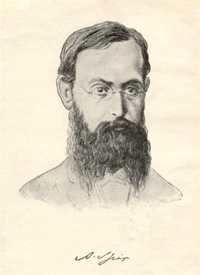Источник: Words of a Sage : Selected thoughts of African Spir (1937), p. 60.
Африкан Александрович Шпир: Цитаты на английском языке
Источник: Words of a Sage : Selected thoughts of African Spir (1937), p. 43.
“It depends on ourselves to be to each others, either a blessing or a torment.”
Источник: Words of a Sage : Selected thoughts of African Spir (1937), p. 37.
"jouissance", Fr.
Источник: Words of a Sage : Selected thoughts of African Spir (1937), p. 48 - Gandhi wrote something that is almost word for word the same, in All men are brothers.
Источник: Words of a Sage : Selected thoughts of African Spir (1937), p. 50.
or collapse, or failed
Источник: Words of a Sage : Selected thoughts of African Spir (1937), p. 41.
Источник: Words of a Sage : Selected thoughts of African Spir (1937), p. 52.
Источник: Words of a Sage : Selected thoughts of African Spir (1937), p. 38.
Источник: Words of a Sage : Selected thoughts of African Spir (1937), p. 60.
Источник: Words of a Sage : Selected thoughts of African Spir (1937), p. 38 ["… moral consciousness is an innate and intimate revelation of the absolute, which exceed every empirical data..." - see above].
Источник: Words of a Sage : Selected thoughts of African Spir (1937), p. 45.
Источник: Words of a Sage : Selected thoughts of African Spir (1937), p. 52.
Источник: Words of a Sage : Selected thoughts of African Spir (1937), pp. 64-65 - end of parenthesis.
Источник: Words of a Sage : Selected thoughts of African Spir (1937), p. 55.
Источник: Words of a Sage : Selected thoughts of African Spir (1937), p. 43.
Источник: Words of a Sage : Selected thoughts of African Spir (1937), p. 56.
Источник: Words of a Sage : Selected thoughts of African Spir (1937), p. 54.
Источник: Words of a Sage : Selected thoughts of African Spir (1937), p. 60.
Источник: Words of a Sage : Selected thoughts of African Spir (1937), p. 51.
"Le concept de l'absolu, d'où découlent, dans le domaine moral, les lois ou normes morales, constitue, le principe d'identité, qui est la loi fondamentale de la pensée; il en découle les normes logiques qui régissent la pensée dans le domaine de la science."
Источник: Words of a Sage : Selected thoughts of African Spir (1937), p. 59 [Hélène Claparède-Spir had underlined - the translator]
Источник: Words of a Sage : Selected thoughts of African Spir (1937), p. 49.
Источник: Words of a Sage : Selected thoughts of African Spir (1937), p. 61.
Источник: Words of a Sage : Selected thoughts of African Spir (1937), p. 40.
Источник: Words of a Sage : Selected thoughts of African Spir (1937), p. 48.
Источник: Words of a Sage : Selected thoughts of African Spir (1937), p. 48.
Источник: Words of a Sage : Selected thoughts of African Spir (1937), p. 42.
Источник: Words of a Sage : Selected thoughts of African Spir (1937), p. 41.
Источник: Words of a Sage : Selected thoughts of African Spir (1937), p. 51.
“The moral improvement demands an evolution leading to a higher consciousness”
Источник: Words of a Sage : Selected thoughts of African Spir (1937), p. 60 - Hélène's Claparède-Spir underlined.
Источник: Words of a Sage : Selected thoughts of African Spir (1937), p. 37.
